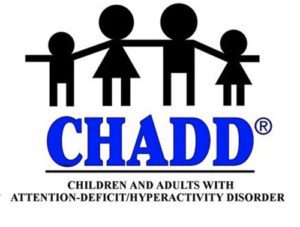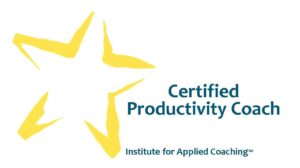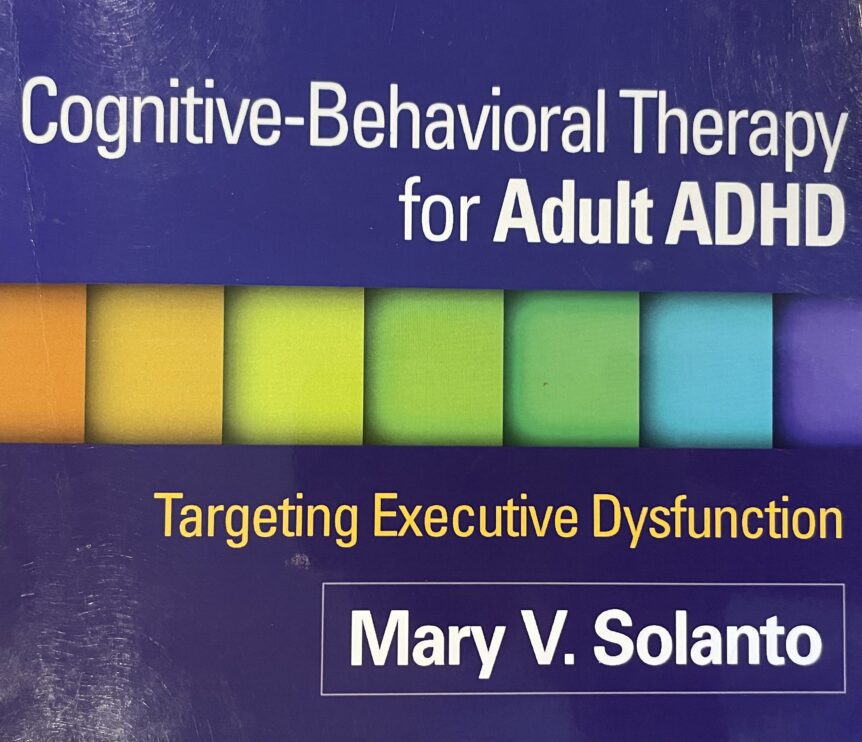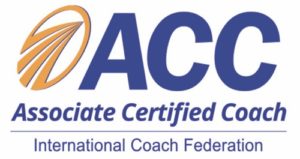NOTE: I am a certified ADHD Coach, not a therapist. Because I am not a therapist, I can not practice Cognitive Behavioral Therapy (CBT); however, multiple therapists familiar with my work acknowledge that I use CBT-like strategies with my clients.
——————————————————————————————————————–
Cognitive-Behavioral Therapy for Adult ADHD (CBTAA) (Solanto) was written to help therapists deliver a group-oriented approach to impart skills and strategies, allowing participants to manage their day-to-day challenges more effectively. Although the book was written for therapists, including many therapeutic references and recommendations for “treatments” that are not part of my coaching practice, I found the reading easy and the content easily applicable to my clients.
In particular, the book focuses on learnings in a group educational and supportive environment. Many of the 12 “sessions” the book is structured around include education and recommendations for behavioral change. At a high level, CBTAA covers:
Making peace with an ADHD diagnosis: Many of my clients come to coaching, recently diagnosed, searching for concise and approachable education. The therapists my clients work with do the heavy-lifting of working through the emotional trauma many individuals with ADHD carry with them. CBTAA offered me additional information and language to assist my clients through this process. If you are looking for further insight, a recent blog post highlights some of my favorite resources, including authors, podcasts, and tools.
Time Management: An ADHD brain has a loose association with time; therefore, time management is an ongoing challenge. Sessions 2-6 focus on the nuances of time management, including awareness, project/task management, to-do lists, emotional obstacles, activation, and motivation.
Organization: I started my journey to support individuals with ADHD as Professional Organizer. Sessions 7-9 focus on many of the common organizational challenges I encountered as a hands-on organizer. Yes, there are many books on how to get organized; however, few effectively help individuals with ADHD overcome their non-linear processing challenges.
Project Management: Many of my clients struggle with breaking a project down into manageable tasks. Therefore projects can be intimidating and are frequently left undone. I often use the example of getting the oil changed in our car as being a project made up of smaller, more-manageable tasks:
- Find a reputable repair shop. This can be done by crowd-sourcing information via Facebook, friends, neighbors, etc.
- Call the repair shop and compare calendars to find a mutually acceptable day/time.
- Determine if the appointment is a “wait until it gets done” or “drop off and pick up” appointment.
- If waiting is the process, no additional action is required.
- If dropping off is the process, ask if a loaner car is available.
- If so, great.
- If not, enlist support to help with transportation.
Many people put “get the oil changed” on their calendar as a task when it is a project made up of multiple, more minor tasks. Therefore, identifying the distinction between projects and tasks is critical to activation.
Session 12 of the CBTAA curriculum focuses on what’s next for the participants. In my practice, it’s a conversation around ensuring the hard work they’ve done through the coaching process becomes part of how they create the more rewarding life they want to live.
Bottom line, whether you are a therapist, coach, or individual interested in making progress with ADHD, Cognitive-Behavioral Therapy for Adult ADHD is a great resource.
Cindy Jobs, PCAC
![]()
Looking for more information?
Click here for ADHD-friendly Time Management Tools
Click here for 15-minute organizing tips.
Click here to schedule a complimentary breakthrough session.
For more helpful information, follow me on Facebook.



Former member:







